Do you have a question about the Husqvarna RZ4222F and is the answer not in the manual?
Defines terms and references for the operator's manual, including left/right and forward/backward directions.
Provides instructions and regulations for transporting the machine on public roads, emphasizing secure anchoring.
Offers guidance and precautions for towing equipment with the machine, including turn radius and speed.
Details the intended use of the machine for mowing lawns and general safety guidelines for operation.
Emphasizes the importance of specialized retail stores for support and service, and documentation in the Service Journal.
Explains how to locate and identify the machine's manufacturing number, model, and serial number.
Illustrates symbols for machine operation controls, indicators, and certifications like CE conformity.
Presents safety symbols used in the manual and on the machine to warn of potential hazards.
Depicts various safety symbols and their meanings, including warnings for thrown objects and blade hazards.
Provides critical safety warnings about the cutting machine's capabilities and potential for severe injury or death.
Outlines essential safety practices for operating the machine, including clearing the area and proper use of controls.
Details the necessary personal protective equipment (PPE) to be worn during operation and maintenance.
Provides safety guidelines and warnings for operating the machine on slopes, including maximum angle limits.
Highlights the dangers posed by children around the mower and stresses the importance of keeping them away.
Offers crucial safety instructions for handling gasoline, emphasizing flammability and explosion risks.
Covers essential safety precautions and procedures for performing general maintenance on the machine.
Provides safety advice for loading, unloading, and securing the machine during transport.
Details safety precautions and limitations when towing equipment with the machine.
Explains the use and maintenance of a spark arrestor for engines operating in certain land conditions.
Identifies the primary controls and their locations on the machine's operator panel and chassis.
Explains the function and operation of the hydrostatic steering control levers for movement and turning.
Describes the location and operation of the parking brake lever for securing the machine.
Details how to use the throttle control to adjust engine speed and blade rotation.
Explains the operation of the blade switch for engaging and disengaging the mower deck.
Describes the ignition switch for starting, stopping, and controlling accessory functions like headlights.
Details the function of the choke control for cold starts to enrich the fuel mixture.
Identifies the location and types of fuses used in the machine's electrical system.
Provides information on the fuel tank capacity, type of fuel, and refueling precautions.
Explains the location and operation of the fuel shut off valve for controlling fuel flow.
Describes how to adjust the mower deck's cutting height using the provided lever and pin.
Explains the function of bypass linkages for manually moving the machine and associated safety warnings.
Details how to adjust the operator's seat lengthways for comfort and proper operation.
Explains the function of the hour meter for tracking operating time and service reminders.
Describes how to use the tracking knob for fine-tuning steering alignment and straight-line tracking.
Offers advice for new operators on familiarizing themselves with the machine's unique zero-turn capabilities.
Details how to control the machine's direction and speed using the steering levers, including zero-turn maneuvers.
Lists essential pre-operation checks and procedures, including safety, controls, and seat adjustment.
Provides a step-by-step guide for starting the machine's engine, including safety interlocks and choke usage.
Offers warnings and advice regarding weak batteries and precautions when handling lead-acid batteries.
Details the correct procedure for using jumper cables to start the engine from another vehicle's battery.
Explains how to safely start moving the machine, engage the mower deck, and operate at full throttle.
Provides critical safety instructions and operational guidance for mowing on sloped terrain.
Offers advice for achieving optimal mowing results, including cutting height, speed, and deck cleaning.
Details the correct procedure for safely stopping the engine and disengaging all machine functions.
Describes how to engage bypass linkages to manually push or pull the machine, with safety warnings.
Provides a comprehensive schedule of daily, weekly, monthly, and hourly maintenance tasks for the machine.
Covers battery maintenance, cleaning, charging times, and replacement procedures, with safety precautions.
Explains the machine's safety system features that prevent starting or driving under certain conditions.
Details how to visually inspect and test the parking brake's functionality and adjustment.
Specifies the correct tire pressure for all wheels to ensure proper operation and even mowing.
Provides instructions for checking caster wheel rotation and potential warranty implications.
Outlines inspection procedures for V-belts, including signs of wear and when to replace them.
Details the process for removing and installing the mower deck belt, including routing and tensioning.
Emphasizes the importance of sharp, undamaged blades and procedures for replacement and balancing.
Provides a guide for leveling the mower deck to ensure an even and high-quality cut.
Recommends regular cleaning of the machine, especially the mower deck, to prolong its life.
Instructs users to check the machine daily for loose or missing hardware to ensure safe operation.
Presents a chart outlining lubrication points and intervals based on operating hours and time.
Provides general guidelines for lubrication, including safety, grease types, and avoiding contact with belts.
Details lubrication points for wheel bearings and deck components using a grease gun.
Specifies lubrication for the front wheel bearings and mounts.
Provides instructions for lubricating the front wheel bearings with a grease gun.
Explains how to lubricate the deck spindles, including deck height adjustment and foot plate removal.
States that the transmission is maintenance-free, with instructions to contact a dealer for leaks.
Lists common causes for the engine failing to start, such as safety interlocks or battery issues.
Identifies potential reasons why the starter motor does not engage, including battery and fuse issues.
Details causes for rough engine operation, such as fuel mixture, spark plugs, or air filter problems.
Outlines possible causes for reduced engine power, including clogged filters and improper carburetor adjustment.
Lists potential causes for machine vibration, such as loose or unbalanced blades or engine issues.
Covers reasons for engine overheating, including cooling fin blockages, overloads, and low oil.
Identifies causes for the battery not charging, such as poor terminal connections or a disconnected charging lead.
Lists common issues affecting machine movement, including brake engagement, belt problems, or hydraulic system air.
Explains potential causes for the mower deck failing to engage, such as loose belts or faulty switches.
Identifies causes for transaxle oil leaks, such as damaged seals or air trapped in the hydraulic system.
Details factors contributing to uneven mowing, including tire pressure, blade condition, and deck leveling.
Provides instructions for preparing and storing the machine for extended periods, including fuel stabilization.
Recommends annual servicing by an authorized workshop to ensure optimal performance and longevity.
Lists torque values for various fasteners, including engine bolts, lug nuts, and blade bolts.
Mentions 'Collection system' as an available accessory for the machine.
Provides detailed specifications for the engine, including manufacturer, type, power, and fuel requirements.
Details specifications for the transmission system, including type, speed controls, and brakes.
Lists specifications related to the machine's frame, cutting width, height, and blade count.
Provides the machine's weight and overall dimensions, including length, height, and width variations.
Explains labels on the machine that confirm compliance with USA and state-specific requirements.
Lists checks and procedures performed during initial delivery service and customer information provided.
Details the initial maintenance required after the first 10 hours of operation, primarily engine oil change.
Outlines the maintenance tasks to be performed every 25 hours of operation, including filter checks and lubrication.
Specifies the maintenance tasks required every 50 hours, building upon previous service intervals.
Details the maintenance schedule for every 100 hours of operation, including spark plugs and V-belt checks.
Lists the extensive maintenance tasks required at 300-hour intervals, including engine component checks.
Defines annual maintenance tasks, such as cleaning air intake, changing oil filter, and checking valve clearance.
| Brand | Husqvarna |
|---|---|
| Model | RZ4222F |
| Category | Lawn Mower |
| Language | English |
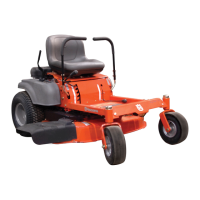

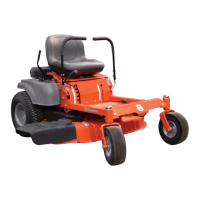




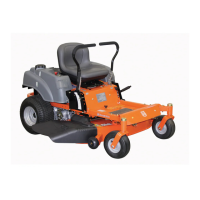


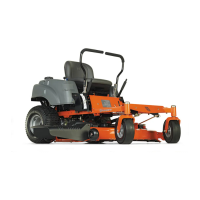
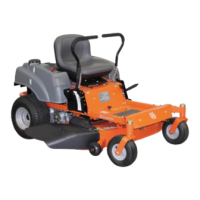
